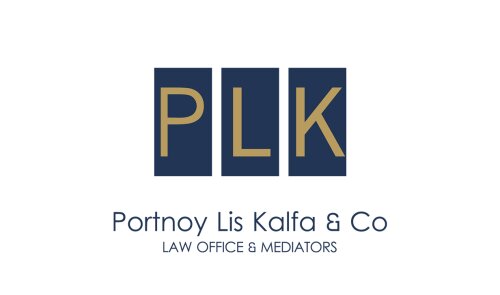Best Real Estate Lawyers in Ashdod
Share your needs with us, get contacted by law firms.
Free. Takes 2 min.
Free Guide to Hiring a Real Estate Lawyer
List of the best lawyers in Ashdod, Israel
About Real Estate Law in Ashdod, Israel
Ashdod is one of Israel’s largest and fastest growing cities, offering a dynamic real estate market that attracts both local residents and international investors. Real estate law in Ashdod follows the national legal framework set by Israeli legislation but also reflects unique local regulations and market trends. Transactions typically involve purchasing or leasing apartments, houses, and commercial properties. The legal landscape is highly regulated to ensure clarity and security for all parties involved, making due diligence and legal guidance essential.
Why You May Need a Lawyer
Engaging with the real estate market in Ashdod often involves complex legal considerations. Here are some common situations where you might need a real estate lawyer:
- Buying or selling residential or commercial property
- Reviewing or drafting real estate contracts
- Verifying property ownership and title status
- Dealing with disputes between buyers, sellers, or neighbors
- Handling inheritance and property registration issues
- Resolving zoning and building permit challenges
- Navigating issues related to taxes and municipal levies
- Managing rental agreements and landlord-tenant relations
- Addressing construction defects or delays in new developments
- Representing your interests in court if legal disputes arise
A knowledgeable real estate lawyer can protect your rights, ensure compliance with local laws, and help avoid costly mistakes.
Local Laws Overview
Real estate transactions in Ashdod are subject to both national Israeli laws and local municipal regulations. Some key aspects include:
- Land Ownership Types: Most land in Israel is owned by the Israel Land Authority and leased to individuals under long-term contracts, while some properties are privately owned.
- Registration System: All property transactions must be registered in the Land Registry (Tabu), which provides an official record of ownership and prevents disputes.
- Contractual Process: Real estate contracts must be in writing. They usually include terms regarding price, payment schedule, delivery, and contingencies.
- Tax Obligations: Buyers and sellers are subject to various taxes, including Purchase Tax (Mas Rechisha) and Appreciation Tax (Mas Shevach), which must be calculated and paid as part of the process.
- Building Permits: Ashdod Municipality enforces zoning and construction regulations. Legal building and renovations require permits and compliance with the city’s building code.
- Tenant Protection: Israel’s tenancy laws protect the rights of both landlords and tenants, covering rent increases, eviction procedures, and security deposit rules.
Understanding this legal environment is crucial to making informed decisions and avoiding legal obstacles in Ashdod.
Frequently Asked Questions
What types of properties can I buy in Ashdod?
You can purchase residential apartments, private houses, offices, retail spaces, and sometimes land, subject to zoning and ownership type limitations.
Do I need a lawyer to buy property in Ashdod?
It is strongly recommended to use a lawyer for any real estate transaction. An attorney ensures the contract protects your interests, verifies the title, manages tax obligations, and facilitates secure registration.
What is the difference between Tabu land and Israel Land Authority land?
“Tabu” refers to properties registered as private ownership with full rights, while Israel Land Authority land is typically leased under long-term contracts but not fully owned. The rights and transaction procedures differ between these types.
What taxes do I need to pay when buying or selling property?
Buyers must pay Purchase Tax, which varies based on the property and buyer’s situation. Sellers may owe Appreciation Tax on capital gains. Your lawyer will help calculate and pay these correctly.
How can I confirm that a property is free of debts or liens?
A lawyer can obtain an official extract from the Land Registry (Tabu) or Israel Land Authority records to verify that there are no encumbrances, debts, or liens on the property.
What is the process for registering ownership after purchase?
After contract signing and payment, your lawyer will submit the necessary documents and tax clearances to the Land Registry for official transfer and registration of the property to your name.
Are there special rules for foreign buyers or nonresidents?
While foreigners can generally buy property in Ashdod, there are additional documentary requirements and some restrictions, especially for land managed by the Israel Land Authority. Legal guidance is essential.
What should I check before buying a new project from a developer?
Review the building permits, expected delivery dates, payment guarantees, and the terms of the sales contract. Have your lawyer confirm the developer’s legal status and any risks.
How are disputes between landlords and tenants resolved?
Israel’s tenancy laws outline procedures for mediation, court claims, and evictions. Most disputes are first addressed through legal notices, and every party has the right to legal representation.
What risks exist when buying real estate without legal advice?
Without legal counsel, you risk unclear ownership, hidden debts, contractual loopholes, costly tax errors, non-compliance with permits, or even losing your investment. A lawyer helps prevent these problems.
Additional Resources
If you require more information or assistance, consider the following resources:
- Ashdod Municipality: Handles building permits, zoning, and municipal levies.
- The Israeli Land Registry (Tabu): Manages property ownership records.
- Israel Land Authority: Responsible for most public lands in Israel.
- Israel Bar Association: Offers directories and referrals for licensed real estate lawyers.
- Ministry of Justice Real Estate Department: Provides consumer protection and regulatory oversight.
These organizations can supply official information, documentation, and guidance, but for personalized legal advice, professional consultation is best.
Next Steps
If you are planning to buy, sell, rent, or develop property in Ashdod and need legal support:
- Gather relevant documents, such as ownership deeds or contracts.
- Outline your goals and any concerns you may have about the transaction.
- Consult a qualified real estate lawyer who specializes in Ashdod and understands local laws and regulations.
- Ask your lawyer to review all documents before signing.
- Ensure that your lawyer handles registration, tax filings, and communication with authorities on your behalf.
Working with a professional will provide peace of mind and help you successfully navigate the legal complexities of real estate in Ashdod, Israel.
Lawzana helps you find the best lawyers and law firms in Ashdod through a curated and pre-screened list of qualified legal professionals. Our platform offers rankings and detailed profiles of attorneys and law firms, allowing you to compare based on practice areas, including Real Estate, experience, and client feedback.
Each profile includes a description of the firm's areas of practice, client reviews, team members and partners, year of establishment, spoken languages, office locations, contact information, social media presence, and any published articles or resources. Most firms on our platform speak English and are experienced in both local and international legal matters.
Get a quote from top-rated law firms in Ashdod, Israel — quickly, securely, and without unnecessary hassle.
Disclaimer:
The information provided on this page is for general informational purposes only and does not constitute legal advice. While we strive to ensure the accuracy and relevance of the content, legal information may change over time, and interpretations of the law can vary. You should always consult with a qualified legal professional for advice specific to your situation.
We disclaim all liability for actions taken or not taken based on the content of this page. If you believe any information is incorrect or outdated, please contact us, and we will review and update it where appropriate.
Browse real estate law firms by service in Ashdod, Israel
Ashdod, Israel Attorneys in related practice areas.










